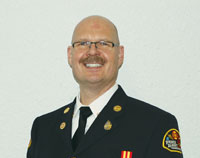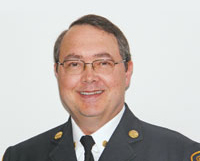
Features
Leadership
Leadership Forum: November 2011
Many of our columns have attempted to offer sage advice on topics such as building partnerships, creating a positive culture within your organization and leading by example.
November 14, 2011
By Les Karpluk Lyle Quan
Many of our columns have attempted to offer sage advice on topics such as building partnerships, creating a positive culture within your organization and leading by example. But when we talk about leadership, do you know what the true essence of leadership is all about? Better yet, what is your definition of leadership?
We posed this question to other chief officers and received some interesting responses:
- Leadership is when people do what you tell them to do.
- Leadership is gaining the trust of others and demonstrating that you have earned that trust.
- Leadership is not asking others to do something that you wouldn’t do yourself.
- It’s leading by example and earning it every day.
- Leadership is when others are willing to give you the power to lead them; it’s not about how much gold you have on your shoulders.
- Leadership is about having a vision and convincing others to buy into that so it can become a reality.
While we agree with all of these statements, we know that the actual essence of leadership may differ somewhat for all of us. We further suggest that it’s what you feel you need to do based on your previous teachings and beliefs that determines your actions as a leader.
Think about which role models come to mind when you think about those who emulate your concept of leadership. Do you think of people like Colin Powell, Alan Brunacini, Rick Hillier, Stephen Harper or someone who works with you? Think for a minute about what those individuals stand for and why their actions are important in shaping the way you want to lead.
Part of your job as a leader is to go beyond simply leading your team to the next level. Leadership is also about challenging team members to take the lead once in a while and to demonstrate that they know the pathway to the next level. By communicating with your team members, you are showing them the way, thus using one of your greatest strengths – the talents of your team.
True leadership is the ability to teach others to lead in good times and bad. It’s easy to lead when things are going well and members of the department are functioning as a team. Almost anyone can lead in this type of environment. The real essence of leadership is taking all you have learned and passing it on to those who aspire to be leaders.
When the unwritten expectations of each party in the relationship are broken, leadership becomes challenging. Breaking this psychological contract usually results in conflict. During these challenging times, the descriptions of leadership could include:
- Leadership is an emotional challenge every day.
- It’s painful to be a leader.
- Leadership is lonely and unrewarding.
- Leadership is about being kicked in the gut.
All leaders face challenges in their careers and this is when leadership takes on the greatest importance.
As Winston Churchill stated in one of his darkest times during the Second World War, “I have nothing to offer but blood, toil, tears and sweat.” We learned from Churchill that we must not forget our humanness, our desire to fight for what is right (not to fight because it’s a fight) and to do the best we can, given the circumstances. In other words, never give up just because you are facing dark and dismal circumstances.
People will still disagree with you, even if you are doing what is right and for the right reasons. However, knowing that your decision-making process is ethically sound and morally defensible can give you confidence that you are demonstrating solid leadership skills.
In our columns, we continually put forward ideas to help fire-service leaders be better prepared for the good times and the bad. Keeping up with leadership and motivational theories and conflict-management skills is a never-ending task and an essential component in the leadership journey. The challenge is to determine what you believe is the true essence of leadership and to create your own definition of leadership.
We’ll leave you with one final question to ponder. If you were to leave your organization today, what legacy would you leave with your team members? Would they cheer because you are finally leaving the building, or would they cheer because you have left them with a true feeling of self-worth and the necessary tools to continue to lead the organization? Your answer requires a true self-analysis and lots of reflection.

|
|
 |
Les Karpluk is the fire chief of the
Prince Albert Fire Department in Saskatchewan.
Lyle Quan is the fire chief of the Waterloo Fire Department in Ontario.
Both are graduates of the Lakeland College Bachelor of Business in
Emergency Services program and Dalhousie University’s Fire
Administration program.
Print this page